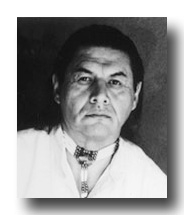| Friends Of The Little Bighorn Battlefield |
The Next Generation In The Study Of Custer's Last Stand |
Walking With Grandfather |
| • The Battle • Archeology • Memorials • Little Bighorn Store • News • Book Reviews |
Walking With Grandfather: The Wisdom of Lakota EldersBy Joseph Marshall IIIBook Review by Bob Reece, February 2006Webmaster’s Note: Joseph Marshall, descended from warriors who fought Custer along the Little Bighorn River, is one of the original co-founders of the Friends of the Little Bighorn Battlefield. Today he brings us a completely new book – different from anything he has written in the past. His early writings were mostly fiction, then non-fiction, and now philosophy. All excerpts from "Walking with Grandfather", copyright by the author and Sounds True, Inc. Joseph Marshall III journeys into a wholly new literary world and presents his most unique and valuable work to date with “Walking with Grandfather: The Wisdom of Lakota Elders.” As a young boy, Marshall spent countless hours walking the trails along the Little White River in South Dakota with his grandfather Albert, a Sicangu Lakota. The knowledge Marshall gained during those intimate moments has served him well throughout his career and life. Marshall’s writing is not the shoddy new-age-native-american-pyramid-consciousness-enlightenment philosophy that has highjacked real American Indian religious rituals and beliefs. Rather, Marshall’s sharing of Grandpa Albert’s understanding of life, people, and society is simple and straight forward, yet its benefits are powerful for one’s soul. This philosophy is not just an American Indian philosophy but it is also valuable for all societies. Marshall’s voice speaks from the heart, about living and death, the body and its spirit. He warns us that ignorance sometimes accompanies man’s commanding intellect creating more harm than good. We must always remember where we come from to keep us humble. Humbleness ensures we move forward, generation after generation in a positive way. “Walking with Grandfather” is sculpted from Lakota wisdom, history, and mythic stories. Marshall shares wonderful tales of wolves, the greyhound and the rabbit, the bow and arrow, and more. All these tales of fiction accent an important point that provides great wisdom for living in a very busy world. We should slow down and always remember where we came from, our ancestors that walked before us, and learn from them. Marshall states,
It is our elders, Marshall pleads, that we must not forget and that we need to learn from.
“Walking with Grandfather” addresses the difficult subjects of war and death. We learn how Lakota society looked upon its young men going off to war. Marshall shares a remarkably simple gift that the Lakota gave their warriors when they returned home from battle. It is a gift from the heart and it is one I believe American society failed to give her warriors returning home from the Vietnam War. I believe what we gain most from “Walking with Grandfather” is that life is a wonderful journey and that our eventual death should not scare us. During this journey we should respect our elders and learn from their wisdom so that we can make a better world for our children and grandchildren. All journeys, all walks along a trail beside a river must come to an end. Grandpa Albert lived a good and giving life, and died a Lakota elder. His death and the celebration of his life are uplifting and grand. You will cry, not from sadness, but from happiness in that you had a chance to know Grandpa Albert. Books On The Horizon Home |
|
||
|
Copyright 1999-2013 Bob Reece Friends Little Bighorn Battlefield, P.O. Box 636, Crow Agency, MT 59022 | Home |
Board of Directors |
Guest Book | Contact | Site Map
| |
|||
